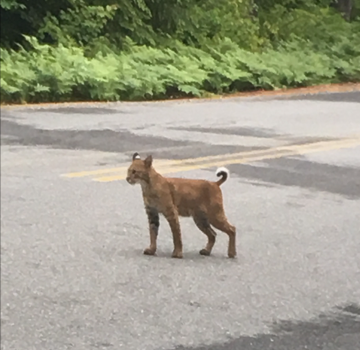On occasion we hear an excited call when perhaps the single loon comes too close to the pair, but it lasts only a minute and is over. Loons have many different vocalizations; you can listen to them, and read short descriptions of each at the Cornell Lab of Ornithology website.
One night this week I was awakened at 3:00 am by the familiar call of the Barred Owl's, "who cooks for you?"
 |
| A barred owl on look out |
I never mind be roused by this sound. That night it went on for several minutes, and then after a short break, was replaced by a raucous, wild racket known as "caterwauling." I reviewed Stokes "A Guide to Bird Behavior" to see what I could learn about this call, and was surprised to find that very little is known about this large yet common raptor. Stokes provided the same guesses I had: that it's either a pair interacting (a domestic squabble?) or two territorial birds claiming the hunting grounds. Even the Cornell site provides no explanation for their calls, but you can listen to them here.
The barred owl can often be heard during the day as well, and not infrequently observed. Walking with a friend at Page Pond Forest in Meredith last week, a barred owl flew right over us and across the quarry pond to land in a pine tree. It was too far away for a good look, but as the photo below shows, it was a barred owl. Your best bet to see one is in dense, mature forests on a hot, humid, summer afternoon.
 |
| Barred Owl at the Quarry Pond |
A bird one doesn't hear at night is the great blue heron, but if often gives its distinctive croak in the late evening as it returns to its roost.
 |
| A great blue Heron takes flight |
Early this spring I noticed the rookery up at Arbutus Hill Pond in the Eames conservation area looked like it was being maintained so I made a mental note to check on it this spring. This week I took a pair of small binoculars on a run up there, and sure enough, there were three quite large juvenile herons sitting there filling up the nest, waiting for a parent to return with a food delivery. If I get up there on a walk with a camera before they depart I'll see if I can get a picture, but it doesn't look like they will be there long. If you want to see them you should go soon - here's the viewing location (red star):
A quick follow up on last week's snapping turtle story: Neil was right, some astute predator returned to the beach to feast on the freshly laid turtle eggs.
 |
| Someone had a nice feast of fresh snapping turtle eggs |
And another great reader sighting from last week:
 |
| Bobcat on Chemung Road in its summer dress |
 |
| Momma bobcat this past winter |
Like the bobcats, we are now wearing our summer clothes and enjoying these long, hot summer days. But when the sun goes down, keep those windows open and discover what nighttime sounds are floating though the air in your neck of the woods.
 |
| Ker-Splash - A beaver crashes its tail on the water at night |


No comments:
Post a Comment